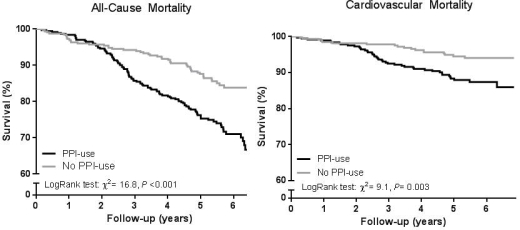Use of Proton-Pump Inhibitors is Associated with Lower Magnesium and Iron Status and Excess Mortality in Renal Transplant Recipients
A. Gomes-Neto,1 R. Douwes,1 M. Eisenga,1 S. Berger,1 R. Gans,1 E. Berg,1 G. Navis,1 H. Blokzijl,2 S. Bakker.1
1Nephrology, UMCG, Groningen, Netherlands
2Gastroenterology and Hepatology, UMCG, Groningen, Netherlands.
Meeting: 2018 American Transplant Congress
Abstract number: 139
Keywords: Drug interaction, Kidney transplantation, Survival
Session Information
Session Name: Concurrent Session: Kidney: Cardiovascular and Metabolic - 1
Session Type: Concurrent Session
Date: Sunday, June 3, 2018
Session Time: 4:30pm-6:00pm
 Presentation Time: 4:42pm-4:54pm
Presentation Time: 4:42pm-4:54pm
Location: Room 303
Background
Proton-pump inhibitor (PPI) use is common in renal transplant recipients (RTR). However, PPI use may induce micronutrient deficiencies and has been associated with increased mortality in the general population. We investigated whether PPI use is associated with magnesium and iron status and with mortality in a large cohort of RTR.
Methods
We included 707 RTR with a functioning graft ≥ 1 year. RTR missing data on PPI use were excluded, leaving 703 RTR eligible for analysis. Plasma magnesium, serum ferritin, and 24-h urinary magnesium excretion were measured with standard methods. Associations of PPI use with magnesium and iron status were analyzed by linear regression. The association of PPI use with all-cause (AC) and cardiovascular (CV) mortality were analyzed by Cox regression.
Results
Mean ± SD age was 53 ± 13 years (57% male), median [IQR] time after transplantation was 5.4 [1.9-12.0] years and 373 RTR (53%) used PPI. Plasma magnesium was 2.31 ± 0.29 mg/dL, serum ferritin 118 [55-222] ug/L and magnesium excretion was 8.27 ± 3.89 mg/24h. PPI use was inversely associated with plasma magnesium (β:-0.05, P=0.04), serum ferritin (β:-70.6, P<0.001) and magnesium excretion (β:-1.51, P<0.001), all independent of potential confounders, including age, sex, BMI, eGFR, proteinuria, hs-CRP, WBC, physical activity, smoking, alcohol use, 24-h urinary sodium and potassium excretion and immunosuppressive medication use. During median follow-up of 5.4 [4.8-6.1] years, 151 RTR died, of whom 61 died due to CV disease. PPI use was associated with higher risk of AC-mortality (HR 2.01; 95%CI 1.43-2.83, P<0.001) and CV-mortality (HR 2.28; 95%CI 1.32-3.95, P=0.003). Adjustment for potential confounders did not materially alter these associations (AC-mortality: HR 1.81; 95%CI 1.26-2.61, P=0.001, CV-mortality: HR 1.96; 95%CI 1.09-3.51, P=0.02).
Adjustment for potential confounders did not materially alter these associations (AC-mortality: HR 1.81; 95%CI 1.26-2.61, P=0.001, CV-mortality: HR 1.96; 95%CI 1.09-3.51, P=0.02).
Conclusion
PPI use is associated with lower magnesium and iron status and with higher mortality in RTR. These results indicate that PPI use is not without danger and treatment indication may need to be revised.
CITATION INFORMATION: Gomes-Neto A., Douwes R., Eisenga M., Berger S., Gans R., Berg E., Navis G., Blokzijl H., Bakker S. Use of Proton-Pump Inhibitors is Associated with Lower Magnesium and Iron Status and Excess Mortality in Renal Transplant Recipients Am J Transplant. 2017;17 (suppl 3).
To cite this abstract in AMA style:
Gomes-Neto A, Douwes R, Eisenga M, Berger S, Gans R, Berg E, Navis G, Blokzijl H, Bakker S. Use of Proton-Pump Inhibitors is Associated with Lower Magnesium and Iron Status and Excess Mortality in Renal Transplant Recipients [abstract]. https://atcmeetingabstracts.com/abstract/use-of-proton-pump-inhibitors-is-associated-with-lower-magnesium-and-iron-status-and-excess-mortality-in-renal-transplant-recipients/. Accessed February 19, 2026.« Back to 2018 American Transplant Congress
